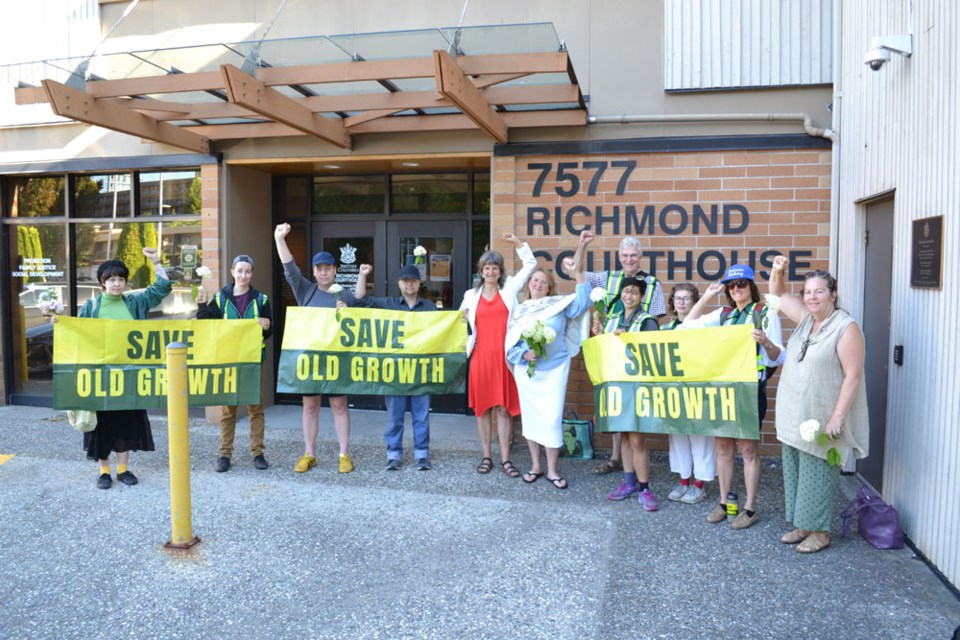Three climate protesters who blocked traffic close to YVR in an Extinction Rebellion protest in 2021 just received suspended sentences and conditional discharges.
Donna Clark, Susan Bibbings and James Darling were each charged with one count of mischief after participating in the Oct. 25, 2021 protest. Bibbings was also charged for participating in a Save Old Growth protest in West Vancouver earlier this year.
All three pleaded guilty to their charges and appeared in Richmond Provincial Court in person on Friday morning to receive the judge’s decision.
The Richmond News had previously reported that Crown prosecutor Ellen Leno was seeking a one-week jail sentence for Bibbings, while defence lawyer asked for conditional sentences for all three.
Richmond provincial court Judge Bonnie Craig outlined her considerations, which include the social context and each protester’s personal circumstances. Submissions to the court included a psychiatric report for Bibbings, which Craig noted “also shed light on some of the mental health issues facing some people as the consequences of climate change become better understood in society.”
“I recognize the urgency felt by the defendants. They all participated in the road blockages only after taking exhaustive other measures to push for legislative changes.
“I understand that it’s the despair each felt by the seeming lack of concern by governments, and much of the general population despite the increasing scientific evidence of peril the planet is facing,” she said.
However, Craig said, the issue before the court was not the need to address climate change.
“There is no question that the defendants’ cause is laudable and necessary. The issue is with the methods used by the defendants to advance this cause,” she said.
She explained that the methods were “self-defeating” as each protester ended up with criminal charges that they could’ve avoided if they had left when the police gave them a chance, and the charges took up government resources that could have otherwise been spent on the environment.
She also said that the methods were “counterproductive” since cars left idling during the blockage contributed to carbon emissions and the protests likely “drew hostility and negative attention” to the cause.
“Although motivated by the desire to build a safer society in the future, the protests failed to account for the safety of society in the moment,” said Craig.
Consequences of criminal records not to be taken lightly
Craig acknowledged that the offences before the court are “serious” because “the road blockage disrupted people’s lives and put the public safety at risk” but said that the social context reduced the protesters’ “moral blameworthiness.”
Although she accepted Crown’s argument that the protesters are not “ordinary first offenders” since they “made a conscious decision to commit the offense,” Craig said she did not believe imprisonment or fines were necessary to achieve the goals of denunciation and deterrence.
Craig noted that the most difficult issue she faced was deciding whether to impose a suspended sentence — which would result in a criminal record — or a conditional discharge.
She said the consequences of a criminal record should not be “taken lightly.”
“A criminal record can affect a person’s employment, volunteer opportunities and ability to travel. Furthermore, there is a stigma attached to a criminal record, a stigma that does not fit with the character of a typical protester,” said Craig.
On the other hand, Craig said to grant a conditional discharge she must be satisfied it’s in the protesters’ best interest and it’s not contrary to public interest.
For Clark, Craig decided on a conditional discharge with 12-month probation, stating it would be in the public’s best interest as she is a teacher and B.C.’s education sector is experiencing staff shortages.
“Ms. Clark did not plan to commit the offense when she attended the protest. She got caught up in the moment, but regrets her actions,” she said.
Darling and Bibbings, on the other hand, received suspended sentences, which will result in criminal records, as both proceeded to participate in later road blockage protests after being arrested at YVR — Darling in Nanaimo and Bibbings in West Vancouver.
“Mr. Darling’s arrest on the present offence did not deter him from committing a second offence… His comments that he had no plans of reoffending, for the time being, were not terribly reassuring,” she said.
Darling had received a conditional discharge for participating in the Nanaimo protest.
“Mr. Darling needs to understand that if he continues to offend, he will face more severe sentences each time,” said Craig.
Bibbings’ suspended sentence was for the West Vancouver protest and she also received a conditional discharge with 12-month probation for the YVR protest.
“Since committing the second offence [in West Vancouver], Ms. Bibbings has taken steps to address the causes of her offending,” said Craig, noting Bibbings had engaged a psychiatrist for assessment and told the court she intended to focus on legal means of advocacy in the future.
“I am hopeful that Ms. Bibbings will continue on this path since she will face jail if she continues to offend.”
All three are to follow the same conditions including keeping the peace; no blocking or impeding traffic or pedestrians on any B.C. road, highway or public space; and completing 30 hours of community work service.
They are also required to pay a victim fine surcharge of $100 per charge.




